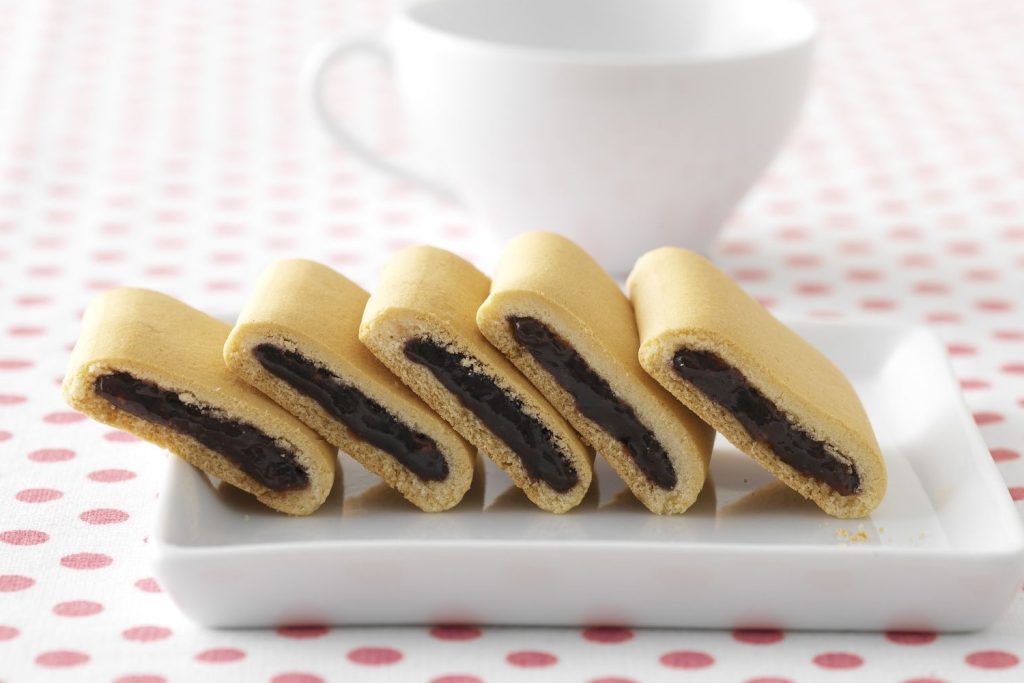In the bustling kitchens of the late 19th century, amidst the clatter of pots and pans, a culinary invention was about to take the United States by storm. Fig Newtons, not just a snack but a cultural icon, began their journey in the hands of James Henry Mitchell, a visionary baker from Cambridge, Massachusetts. With a stroke of genius, Mitchell combined the sweetness of figs with a tender dough shell, creating a treat that would transcend the boundaries of mere confectionery. Named after the illustrious Sir Isaac Newton, these fig bars were a testament to innovation and taste, a combination that would soon catch the eye of the burgeoning National Biscuit Company (Nabisco). As Nabisco took the reins, the Fig Newton was propelled from a local delicacy to a national sensation, leveraging groundbreaking baking processes to meet the insatiable demand. Yet, what's truly fascinating is how these fig-filled delights, originally marketed as a health food, evolved into a cherished snack, weaving their way into the fabric of American snack culture. With January 16 marked as National Fig Newton Day, it's clear these treats have etched their mark not just on calendars but in the hearts of millions.
Key Takeaway
Timeline
Day Activities
-
Kick off National Fig Newton Day with a bang by hosting a bake-off. Invite friends and family to whip up their own version of this classic treat. Whether it's sticking to the traditional fig filling or getting creative with flavors, there's no shortage of ways to put a personal spin on these beloved bars.
-
Organize a fig-themed scavenger hunt for kids and adults alike. Hide fig Newtons and other fig-related items around your home or a local park. Participants can learn fun facts about figs and Fig Newtons at each stop, making it a deliciously educational adventure.
-
Wrap up the day by hosting a Fig Newton pairing party. Experiment with different beverages, like milk, tea, or even wine, to find the perfect match for the sweet and chewy fig bar. Share stories about first Fig Newton experiences or favorite memories involving this timeless snack.
Why We Love This Day
-
Celebrating American Innovation: Fig Newtons are a testament to American ingenuity in the food industry. From the unique idea of encasing fig paste in a dough shell to the revolutionary continuous baking process that made mass production possible, this snack symbolizes the spirit of innovation. Who wouldn't love a day that honors such a clever culinary creation, making it easier for everyone to enjoy a tasty treat?
-
A Nod to Health and History: Back in the day, Fig Newtons were marketed as a health food, thanks to the nutritious figs packed inside. While we might chuckle at the thought of a cookie being considered healthy today, it's fascinating to see how perceptions of food have evolved. Celebrating National Fig Newton Day gives us a chance to reflect on the quirky side of food marketing history and appreciate the journey from health food to beloved snack.
-
Generational Bonding Over a Classic Snack: For many, Fig Newtons are more than just a snack; they're a nostalgic trip down memory lane. Sharing stories about sneaking Fig Newtons from the pantry as kids or enjoying them with grandparents bridges generations. National Fig Newton Day isn't just about indulging in a sweet treat; it's about reconnecting with those childhood memories and the people we shared them with.
Past & Future Dates
| Month | Day | Year |
|---|---|---|
| JANUARY | 16 | 2022 |
| JANUARY | 16 | 2023 |
| JANUARY | 16 | 2024 |
| JANUARY | 16 | 2025 |
| JANUARY | 16 | 2026 |
| JANUARY | 16 | 2027 |
| JANUARY | 16 | 2028 |
FAQ
Why are they called fig newtons?
They earned their name back in 1891, thanks to the Kennedy Steam Bakery. Now, the moniker wasn’t plucked from thin air but chosen in honor of Newton, Massachusetts. After the Kennedy Biscuit Company joined forces with the New York Biscuit Company, the newly merged entity, Nabisco, decided to trademark these scrumptious fig rolls as "Fig Newtons."
What are some fun facts about Fig Newtons?
Fig Newtons have quite the backstory. First baked in 1891 at the F.A. Kennedy Steam Bakery, they were a culinary innovation of their time. Named after Newton, Massachusetts, not too long after their creation, the Kennedy Biscuit Company merged with another baking powerhouse, leading to the formation of Nabisco. This historical snack has been satisfying sweet tooths for over a century now.
Are fig newtons healthy?
Surprisingly, Fig Newtons pack a punch in the nourishment department. Thanks to the figs, these bars are a decent source of fiber, aiding in digestion, alongside a sprinkle of protein, vitamins, and minerals. So, while they're a treat, they also offer up a handful of health benefits.
Do Fig Newtons have anything to do with Isaac Newton?
Contrary to what some might think, the story behind the Fig Newton has zero ties to Isaac Newton. As per insights shared by The Washington Post, this snack instead tips its hat to the city of Newton in Massachusetts. Created in the Boston area more than a hundred years ago, the naming was all about location, not the famed physicist.
